In the U.S. and the Caribbean, lionfish are an invasive species — a top predator with the potential to create massive and irreversible harm to our reef ecosystems. Fortunately for our reefs, the flashy lionfish has caught the attention of the hungriest predators of all: People! The “Eat Lionfish” campaign is a way to make the public aware of this growing threat and invite them to be part of the strategy to combat it and enjoy a tasty fish at the same time.
Fact Sheets
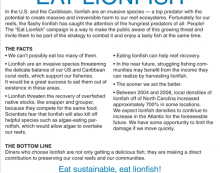 |
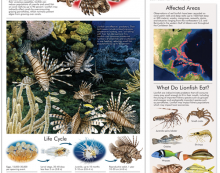 The red lionfish is an invasive species native to the Indo-Pacific Ocean. Their human-caused introduction and subsequent population increase are now causing negative impacts on marine ecosystems in the southeastern seaboard of the U.S. and the Caribbean Sea. Lionfish are efficient predators invading a variety of natural and artificial habitats, competing with native predator fish and consuming smaller fishes, including the young of large species. |
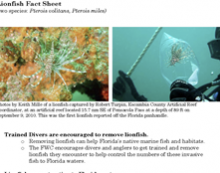 This document provides overall information about lionfish in the U.S, who to respond to, and how to deal with the invasion. |
 The lionfish invasion in Florida and information on how to help. |
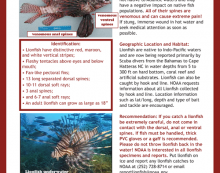 The venomous Indo-Pacific ‘Lionfish’is regularly observed in habitats within the southeast region (Florida to North Carolina) and the Bahamas. These fish are not native to Atlantic waters and may have a negative impact on native fish populations. All of their spines are venomous and can cause extreme pain! If stung, immerse wound in hot water and seek medical attention as soon as possible. |
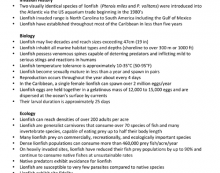 Basic biology and ecology of invasive lionfish |
 The National Lionfish Project is a Pilot Project within a
larger Regional Project entitled Mitigating the Threat of
Invasive Alien Species in the Insular Caribbean
(MTIASIC) funded by the Global Environment Facility
(GEF) and the United Nations Environment Programme
(UNEP). The Lionfish Pilot Project in Jamaica is led by
the University of the West Indies‐ Discovery Bay Marine
Lab (UWI‐DBML) and National Environment and
Planning Agency (NEPA). |
 The Government of Anguilla, through the Department of
Fisheries and Marine Resources, has developed a long-term
Lionfish Response Plan to deal with the social, economic,
and ecological impacts of the invasion of the lionfish into
Anguilla’s waters. |
